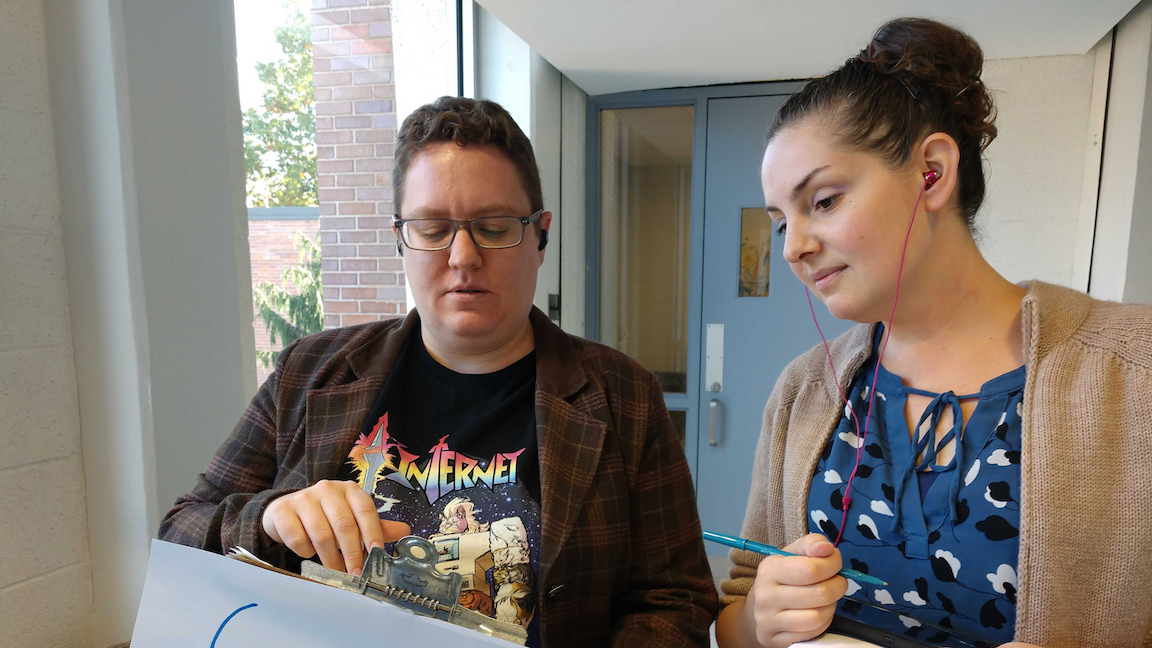Professors in the Media Studies and Production Department have developed a system of co-teaching undergraduate and graduate courses. The co-teaching model gives professors the opportunity to collaborate and help students enhance their intra-disciplinary skills; in the case of the MSP Department, that means strengthening students’ theoretical and production knowledge.
Adrienne Shaw, an associate professor who specializes in media theory; and Laura Zaylea, an associate professor of instruction who primarily works with video production, implemented the model in the fall 2018 semester. They are co-teaching Mobile Media, a newly re-designed upper-level undergraduate course which allows students to study the ability of modern media to be experienced “on-the-go;” and the MA Project Workshop, which assists graduate MSP students in designing their capstone projects.
The two classes are taught simultaneously, with a standard format that is subject to change depending on the day’s course material. MA Project Workshop begins at 5:00 p.m. on Tuesdays, with both Shaw and Zaylea leading the course. At 5:30 p.m., Mobile Media begins, and one of the instructors leaves to lead that course. When MA Project Workshop ends at 7:30 p.m., the instructor still in that class leaves and joins Mobile Media so they can end that class together at 8:00 p.m. Though it may seem complicated, it allows both the professors and the students to gain different understandings of concepts from the perspectives of two different instructors.
“As a department, we take the merging of theory and practice very seriously, I think all of us do,” Shaw says. “But there are a few classes [where] you get to see it in action in a very physical way, and I think the way we go back and forth helps make it more obvious. These theoretical ideas from one week can really apply to the practical making of media texts the following week.”
In a similar way, Zaylea teaches classes with MSP Department co-chair and Associate Professor Matthew Lombard. The curriculum in Zaylea’s course Emergent Media Production directly relates Lombard’s course Psychological Processing of Media. The students in Zaylea’s course produce 360-degree videos and augmented reality projects, which students in Lombard’s research-oriented class use as the basis of a research project. Though Zaylea and Lombard’s classes are not co-taught, the professors often drop in on each other’s corresponding courses.
“Seeing how a study is put together is something I haven’t seen before this collaboration, in this way, so I think it’s incredibly valuable for [my] students to see how research is created,” Zaylea says. “Looking in the other direction for his students, I think it’s easy to dismiss production concerns if you don’t understand how creative production happens.”
Zaylea believes the collaborative co-teaching model not only helps students, but also makes professors aware of one another’s teaching styles and disciplines. As a result, she reflects more on her own teaching methods. She wants to see the model implemented beyond the MSP Department and into Klein College of Media and Communication and Temple University as a whole.
“I really like when some conventional models can kind of open up and spaces for collaboration can be encouraged, and I feel like co-teaching is one way to do that,” Zaylea says. “I learn so much from my students and I learn so much from other faculty members and I love that back and forth: that we’re all on different learning journeys and we’re supporting each other.”

